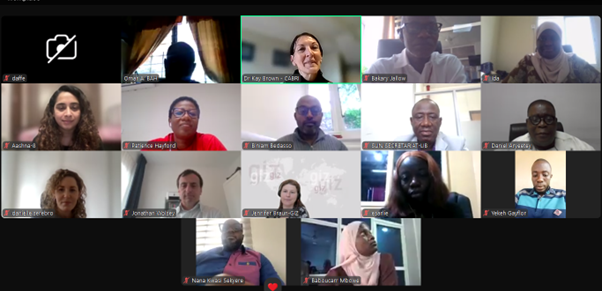
On 15 May, CABRI hosted the mid-term review workshop of the Building Public Finance Capabilities for Nutrition (BPFCN) programme. The workshop gave country-teams Ghana, Liberia and The Gambia the opportunity to share the progress that they have achieved thus far since the framing workshop.
Over the past four months each country-team has collaborated with different stakeholders and with guidance from their authorisers, reassessed their entry points to better understand their nutrition financing problems. Applying the problem driven iterative adaptation (PDIA) approach, participants have learned to be resourceful by gathering additional information and securing acceptance and authorisation for their work.
Challenges are part of any reform. Ghana highlighted the current restructuring process in government as a hinderance in them getting thorough authorisation to move forward. The team from Liberia is struggling to obtain appointments from the Ministry of Health and that of Finance and Development. While The Gambia is struggling to bring the different ministries together as all participants are from the same ministry, of Finance.
Despite the challenges participants have different ways of approaching authorisers and stakeholders, that sometimes, sending a formal letter is not enough. The country-teams have also learned to shift their focus from predefined solutions to working on the problem first.
Guiding country-teams on what public financial management (PFM) reforms work to drive more adequate and efficient public spending on high-impact, cross-cutting priorities guest speaker Alta Fölscher, Principal Consultant at Mokoro presented the Evidence Brief and Research Report for Better Spending. Malnutrition poses a challenge for public administration and finance systems, set up to work in sector silos. The report has found that countries and their partners should have building blocks in place to spend better on cross-cutting issues.
Problem statement each country is working on:
Ghana: Pupils lack sufficient nutritional meals at schools depriving the most vulnerable children from developing cognitively and physically due to inadequate government funding.
The Gambia: Inadequate and irregular coverage and funding of the school feeding programme negatively impacts the nutritional status of school children.
Liberia: There is limited domestic financing for nutrition-specific interventions hindering the fight against malnutrition.
From here onwards, the country-teams will continue to deconstruct their problem statements and refine their action plans. They will do this with the support of their CABRI coaches through an iterative and adaptive action-learning approach.
The BPFCN programme is funded by the EU/BMZ and implemented by GIZ.